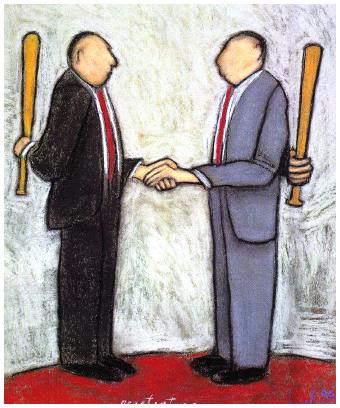Your A to Z Guide To Influence, Persuasion and Negotiation
.
Negotiating is an essential skill. Understand the seven pillars of effective influence. Believe that you can improve your negotiating skills and you can.
Early on
First impressions are an even bigger deal than you thought. A little spinning of the facts here can be a good thing.
There is a home field advantage in negotiation. Even if you’re not on home turf, making yourself at feel at home can give you some of that advantage. Be socially optimistic. Expect that people will like you and they probably will. Yes, small talk is important.
Attitude
Happiness makes you a better negotiator. Think positive about the negotiation and give others a reason to do so as well. Expecting others to be selfish can be a self-fulfilling prophecy. Unless the other guy has few options and you’ll never see him again, being nice is always the way to go.
The Big Guns
Similarity, mimicry and being in sync are all very powerful. Always be thinking about things you have in common. The first thing you should say in a negotiation is something very similar to what the guy on the other side of the table just said. Mimicry is more powerful than you think.
There are solid persuasion lessons to be learned from top telemarketers, great salesmen and FBI hostage negotiators. Make them say “yes yes yes” and they will probably say yes.
Win-win is not always a winning strategy. The key to resisting a convincing sales pitch is to think about money.
Know how to deal with angry people. Know what is proven to work when buying a new car. Know the common pitfalls in negotiations.
Attractive people should negotiate differently than ugly people. Guilting others can work. Subtle reminders of morality are good for keeping people fair. Want to make sure they follow through? Have them write it down.
There is a time – and a proper way – to threaten someone.
Communication
There are many ways to speak more influentially. Understand the best ways to kiss ass. Ass-kissing is good for your health. Using the word “we” can promote an instant feeling of familiarity with someone. There are good techniques for dodging uncomfortable questions in a negotiation.
Learn how to be a better listener. If what you’re saying sounds final people will be more likely to accept it. When you’re a novice, speak confidently. When you’re an expert on a subject, act unsure. Men are easier to persuade via email. With women stick to face-to-face.
Learn about effective posture and body language. If you want to increase the attractiveness of an offer, your body language should be upbeat and sales-y. If you want to reduce resistance, think calm and authoritative.
Trying to seem smart makes you seem stupid. We often prefer eloquence to honesty, sadly. Use rhetorical questions to be more persuasive. And you do want to be more persuasive, don’t you?
Numbers
We can be weird about numbers. Sellers who listed their homes more precisely—say $494,500 as opposed to $500,000—consistently got closer to their asking price. We are irrationally positive toward hearing “100%“. Yes, we like $1.99 more than $2.00 even if we say we know it’s a trick. Know how to anchor because it is ridiculously effective.
Little things
Just remembering the other person’s name makes you more persuasive. Asking someone how they feel, having them verbally respond, and then acknowledging that response, facilitates compliance. Listen to what they have to say and ask them to tell you more.
Touch people. Be funny. Always ask if this is a good time. Let them sleep on it. People will be more likely to agree with you if you make your choice sound like the status quo. Telling stories is powerful in negotiating. “Obscenity at the beginning or end of the speech significantly increased the persuasiveness of the speech.” Emotion is the key to being more credible when complaining.
Name dropping doesn’t work. (Nobody famous told me that.) Obvious and insincere flattery does. Bragging is all about context. Having a third party praise you can influence others – even if that third party is obviously biased.
Sit in the middle to be more influential during a meeting. And repeat yourself. No evidence can sometimes be more persuasive than weak evidence.
What are Jedi level tools of negotiation? Coffee and a cheeseburger.
Practice is key
Not sure if you’re quite ready to put all this into action? Well, “fake it ’til you make it” does work.
Join over 145,000 readers. Get a free weekly update via email here.
Related posts:
How To Stop Being Lazy And Get More Done – 5 Expert Tips
6 Things The Most Productive People Do Every Day
New Harvard Research Reveals A Fun Way To Be More Successful




